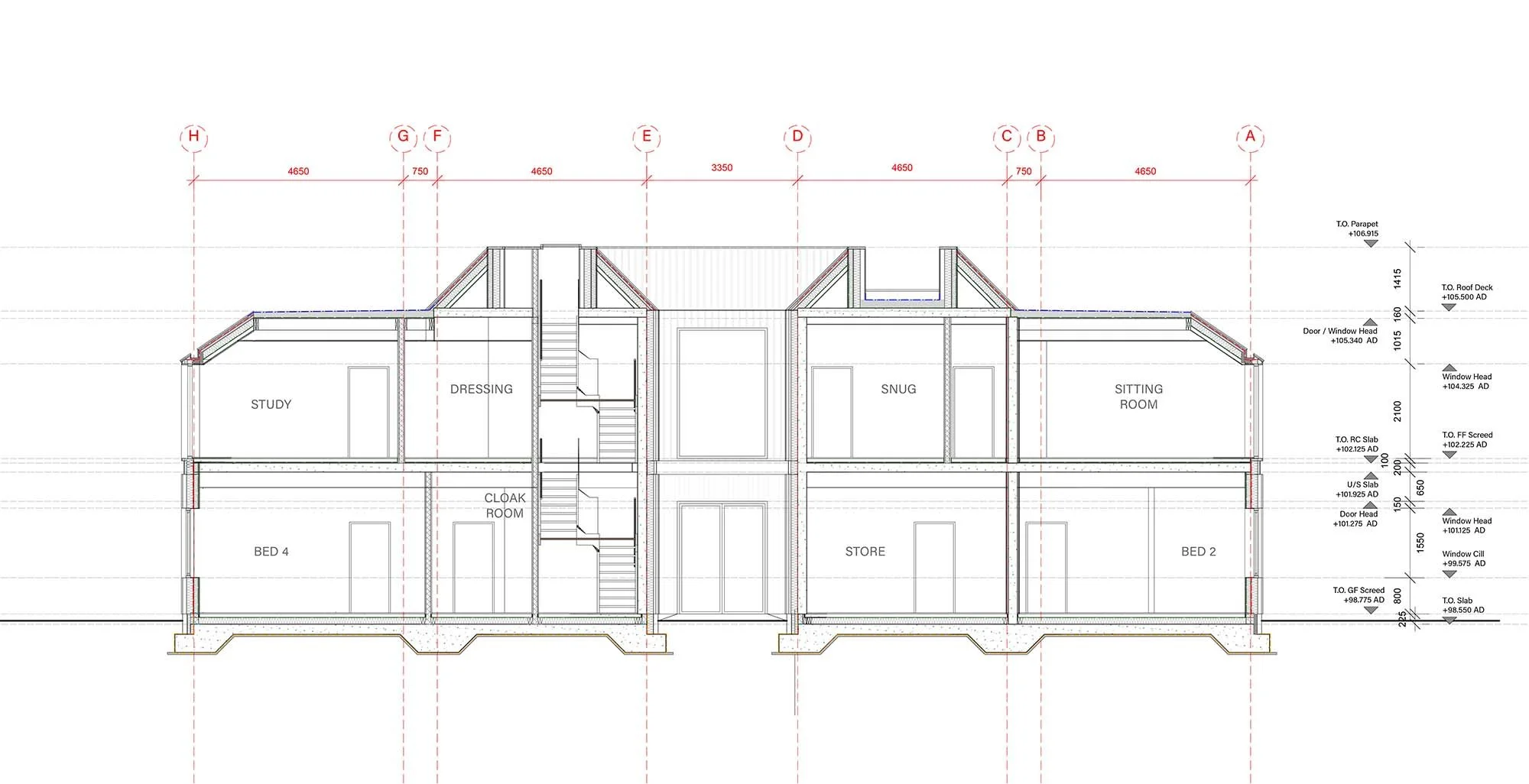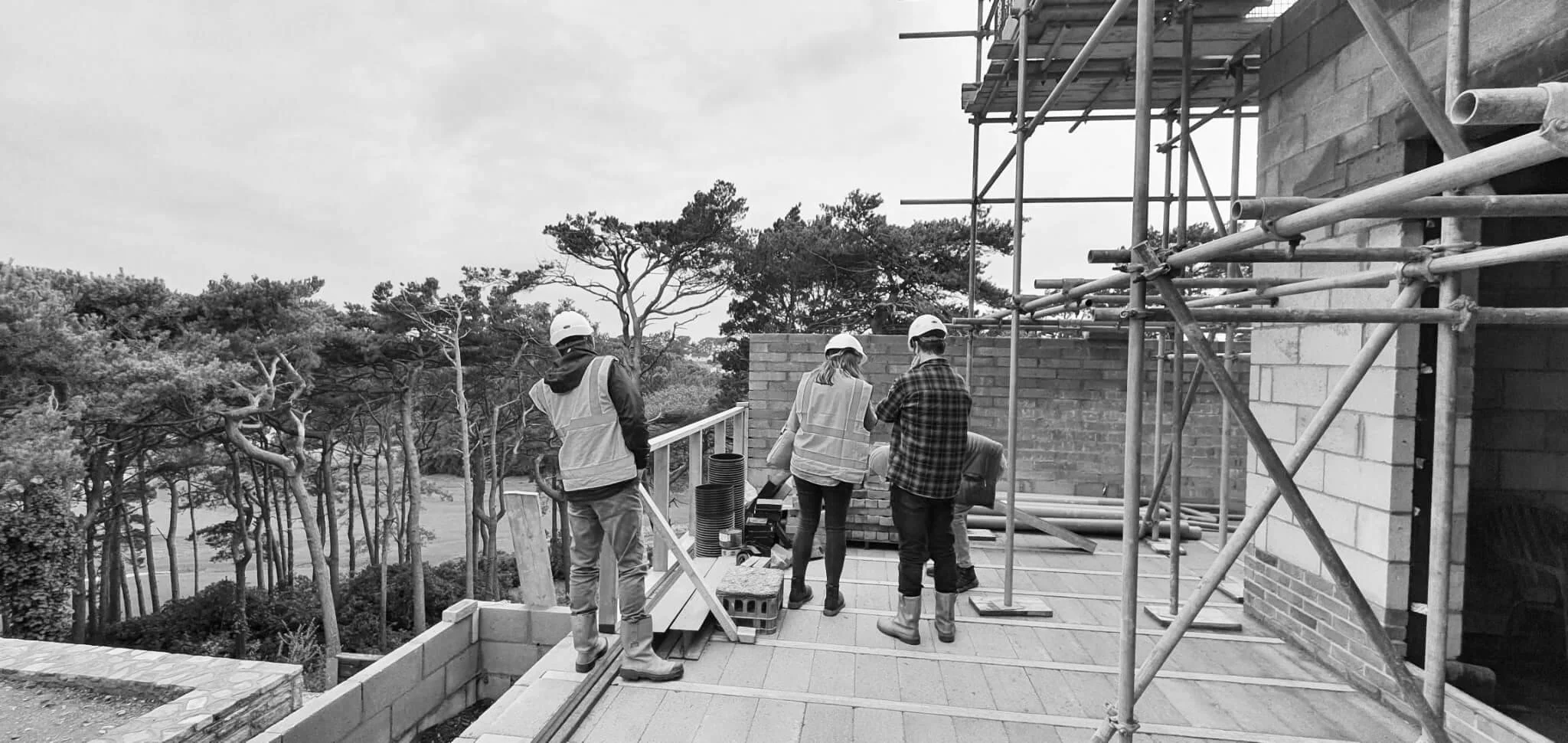our process
We fully understand the commercial viabilities and how good design can really maximise the return on potential development land, whether brownfield or rural settings. We often think 'outside the box' on how to maximise development potential and our extensive technical experience in this market allows us to plan and design at a very early feasibility stage with great efficiencies, so build costs are kept to a minimum.
We generally work within the Royal Institute of British Architects (RIBA) Plan of Work stages, as this is an industry standard that provides a helpful framework to ensure each project is rigorously explored, developed and delivered effectively.
+ stage 0 - 1
preparation and brief
-
We visit the site with you to understand all of the important site constraints such as the surrounding context, topography, neighbouring structures, planning policies, statutory constraints and utility mapping.
We help to organise topographical land surveys and measured building surveys of any existing and neighbouring structures. We also consider and advise on environmental requirements such as tree and ecology surveys where needed.
The fun side - is all about exploring what design ideas you have and inspiration that you want to bring to the project. It is in our ethos to design for our clients, not for ourselves, so the design is very much driven by context, client aspirations and the landscape surroundings.
+ stage 2
concept architectural design
-
We try and convey the ‘feel’ of a design approach and how it is starting to evolve.
We will discuss with you and other supporting professional consultants on how to move the project forwards; both in planning terms (perhaps through a pre-application process to gauge feedback from the Local Planning Authority) or practical terms such as structural design strategies or project procurement (how will the project be built and delivered by a contractor).
+ stage 3
developed planning design
-
We will prepare site analysis drawings, site plans, floor plans, elevations, site sections, mood boards to convey material choices and contextual drawings to show the proposed designs within their context. This is produced in 2D drawings / sketches and 3D visualisations.
We can also prepare supporting reports such as design and access statement or landscape studies in support of the design proposals alongside other consultants reports as needed.
We strongly recommend seeking the early involvement of a quantity surveyor or cost consultant prior to submitting a planning application, so there is reassurance that the finalised design is achievable within the desired budget.
Once submitted, the planning application will take around 8-10 weeks to progress through the consultation and decision-making process. It can vary, depending on the scale and nature of the application. We will keep in regular contact with the Case Officer and address any feedback in a collaborative but sensible way forwards.
Through careful planning and due-diligence, we submit a planning application proposal with the best opportunity of securing approval, however, planning permission is never a guarantee and sometimes requires amendments, re-submissions or appeals to the Planning Inspectorate. We will always be honest and keep you informed of developments at every stage.
On receipt of a planning approval, there may be planning conditions attached which may require information to be discharged to the planning authorities.
+ stage 4
technical design
-
Whether relating to fire performance, structural efficiencies, thermal performance and acoustic requirements - we approach each project with a detailed understanding of the regulatory standards, whilst balancing this with the attention to detail to ensure the end result is true to our original design.
We prepare highly complex technical drawings, schedules and specifications that demonstrate how the building complies with the relevant Building Regulations, British standards and CDM regulation. This is typically split into two stages - stage 4a which is general arrangement information to demonstrate compliance with Building Regulations, through the stage 4b which focuses on producing more detailed construction information that allows a building contractor to understand and price for the desired specification and requirements for the fit out of the project. This reduces risks on site and affords a more accurate tender price.
+ stage 5
construction
-
However, we fully understand the commercial need to mobilise contractors and start enabling works so we work closely with our clients and contractors at this point to assist wherever possible, to make this a smooth process.
We focus on considering a lot of important information within stage 4 of a project, but this naturally develops into further coordination of construction information once the build starts on site. Depending on our appointment at this stage, we can review and comment on sub-contractors proposals, fabricators drawings and other specialist proposals to ensure they are coordinated with the overall design.
Contract documents will be prepared and a form of Building Contract will be entered into between the chosen contractor and the client (employer). This is usually administered by the Contract Administrator which can be us as the Architect, or a third party Cost Consultant or Quantity Surveyor. The Contract Administrator’s role is to independently run the contract in accordance with the contract documents and monitor progress on site, to ensure all parties are dealt with positively and impartially so the project runs smoothly.
+ stage 6 - 7
handover and in-use
-
There will typically be a defect period of 12 months to make sure the build is working well and a final certificate can be issued to sign off the project and building contract.
Most importantly, we want to keep in touch with you and hear how you are experiencing the design. We always want to hear feedback and share experiences together, to inform the next project.
our process
We fully understand the commercial viabilities and how good design can really maximise the return on potential development land, whether brownfield or rural settings. We often think 'outside the box' on how to maximise development potential and our extensive technical experience in this market allows us to plan and design at a very early feasibility stage with great efficiencies, so build costs are kept to a minimum.
We generally work within the Royal Institute of British Architects (RIBA) Plan of Work stages, as this is an industry standard that provides a helpful framework to ensure each project is rigorously explored, developed and delivered effectively.
+ stage 0 - 1
preparation and brief
-
We visit the site with you to understand all of the important site constraints such as the surrounding context, topography, neighbouring structures, planning policies, statutory constraints and utility mapping.
We help to organise topographical land surveys and measured building surveys of any existing and neighbouring structures. We also consider and advise on environmental requirements such as tree and ecology surveys where needed.
The fun side - is all about exploring what design ideas you have and inspiration that you want to bring to the project. It is in our ethos to design for our clients, not for ourselves, so the design is very much driven by context, client aspirations and the landscape surroundings.
+ stage 2
concept architectural design
-
We try and convey the ‘feel’ of a design approach and how it is starting to evolve.
We will discuss with you and other supporting professional consultants on how to move the project forwards; both in planning terms (perhaps through a pre-application process to gauge feedback from the Local Planning Authority) or practical terms such as structural design strategies or project procurement (how will the project be built and delivered by a contractor).
+ stage 3
developed planning design
-
We will prepare site analysis drawings, site plans, floor plans, elevations, site sections, mood boards to convey material choices and contextual drawings to show the proposed designs within their context. This is produced in 2D drawings / sketches and 3D visualisations.
We can also prepare supporting reports such as design and access statement or landscape studies in support of the design proposals alongside other consultants reports as needed.
We strongly recommend seeking the early involvement of a quantity surveyor or cost consultant prior to submitting a planning application, so there is reassurance that the finalised design is achievable within the desired budget.
Once submitted, the planning application will take around 8-10 weeks to progress through the consultation and decision-making process. It can vary, depending on the scale and nature of the application. We will keep in regular contact with the Case Officer and address any feedback in a collaborative but sensible way forwards.
Through careful planning and due-diligence, we submit a planning application proposal with the best opportunity of securing approval, however, planning permission is never a guarantee and sometimes requires amendments, re-submissions or appeals to the Planning Inspectorate. We will always be honest and keep you informed of developments at every stage.
On receipt of a planning approval, there may be planning conditions attached which may require information to be discharged to the planning authorities.
+ stage 4
technical design
-
Whether relating to fire performance, structural efficiencies, thermal performance and acoustic requirements - we approach each project with a detailed understanding of the regulatory standards, whilst balancing this with the attention to detail to ensure the end result is true to our original design.
We prepare highly complex technical drawings, schedules and specifications that demonstrate how the building complies with the relevant Building Regulations, British standards and CDM regulation. This is typically split into two stages - stage 4a which is general arrangement information to demonstrate compliance with Building Regulations, through the stage 4b which focuses on producing more detailed construction information that allows a building contractor to understand and price for the desired specification and requirements for the fit out of the project. This reduces risks on site and affords a more accurate tender price.
+ stage 5
construction
-
However, we fully understand the commercial need to mobilise contractors and start enabling works so we work closely with our clients and contractors at this point to assist wherever possible, to make this a smooth process.
We focus on considering a lot of important information within stage 4 of a project, but this naturally develops into further coordination of construction information once the build starts on site. Depending on our appointment at this stage, we can review and comment on sub-contractors proposals, fabricators drawings and other specialist proposals to ensure they are coordinated with the overall design.
Contract documents will be prepared and a form of Building Contract will be entered into between the chosen contractor and the client (employer). This is usually administered by the Contract Administrator which can be us as the Architect, or a third party Cost Consultant or Quantity Surveyor. The Contract Administrator’s role is to independently run the contract in accordance with the contract documents and monitor progress on site, to ensure all parties are dealt with positively and impartially so the project runs smoothly.
+ stage 6 - 7
handover and in-use
-
There will typically be a defect period of 12 months to make sure the build is working well and a final certificate can be issued to sign off the project and building contract.
Most importantly, we want to keep in touch with you and hear how you are experiencing the design. We always want to hear feedback and share experiences together, to inform the next project.
let’s bring your dream home to life
Every project begins with a chat, so we’d love to hear from you if you have a project in mind or if you just want to start a conversation about how the process works. We are always at the end of the phone if we can help bring a project to life for you…







